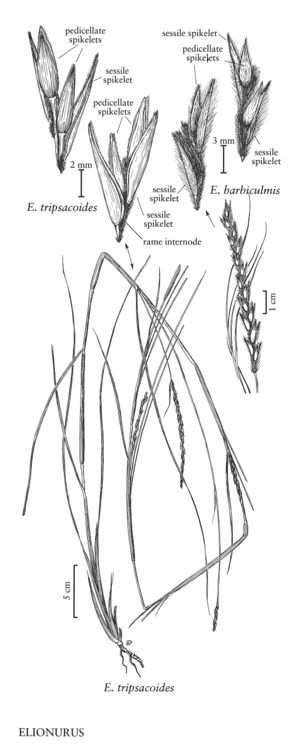Difference between revisions of "Elionurus tripsacoides"
imported>Volume Importer |
imported>Volume Importer |
||
| Line 39: | Line 39: | ||
|publication year= | |publication year= | ||
|special status= | |special status= | ||
| − | |source xml=https://bitbucket.org/aafc-mbb/fna-data-curation/src/ | + | |source xml=https://bitbucket.org/aafc-mbb/fna-data-curation/src/200273ad09963decb8fc72550212de541d86569d/coarse_grained_fna_xml/V25/V25_1639.xml |
|subfamily=Poaceae subfam. Panicoideae | |subfamily=Poaceae subfam. Panicoideae | ||
|tribe=Poaceae tribe Andropogoneae | |tribe=Poaceae tribe Andropogoneae | ||
Latest revision as of 17:57, 11 May 2021
Plants cespitose; with short, knotty, rhizomatous bases. Culms 60-120 cm, glabrous throughout. Sheaths glabrous or pilose on the margins; ligules 0.5-1 mm, membranous, shortly ciliate; blades 16-30 cm long, 2-4 mm wide, adaxial surfaces with hairs to 5 mm basally, glabrous distally, margins ciliate near the bases. Rames 6-15 cm; internodes pilose. Sessile spikelets 6-8 mm; calluses about 1 mm, antrorsely hirsute; lower glumes usually mostly glabrous, rarely sparsely pilose dorsally, keels ciliate distally, apices acuminate, bidentate, teeth about 0.5 mm; pedicels hispid on the margins, usually glabrous elsewhere. Pedicellate spikelets similar to the sessile spikelets. 2n = 20.
Distribution
Miss., Fla., Ala., Ga., Tex.
Discussion
Elionurus tripsacoides grows in moist pine woods and low prairies around southern Texas and the Gulf coast to Georgia, and south through Mexico and Central America to Argentina.
Selected References
None.
